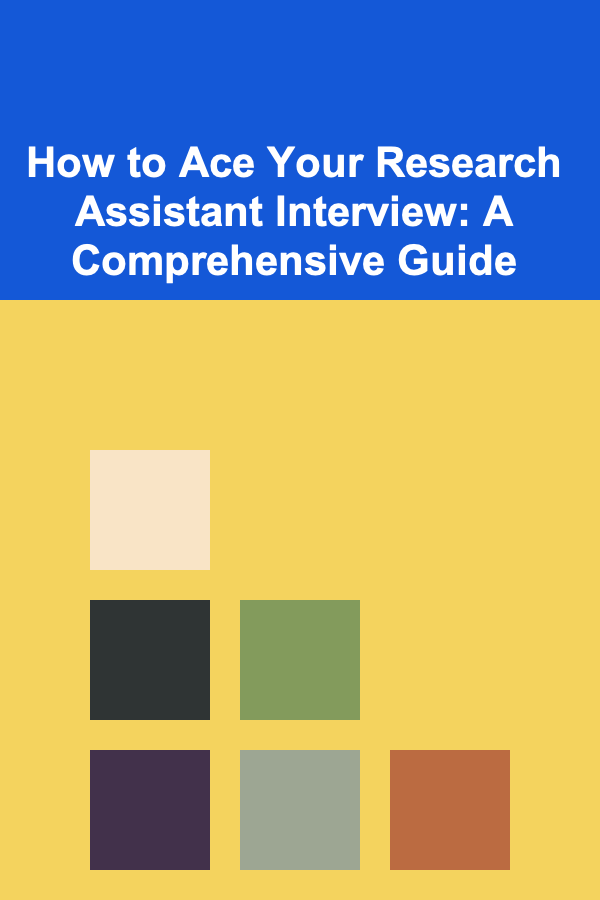
How to Ace Your Research Assistant Interview: A Comprehensive Guide
ebook include PDF & Audio bundle (Micro Guide)
$12.99$11.99
Limited Time Offer! Order within the next:

Securing a research assistant (RA) position can be a rewarding step in your academic and professional journey. Whether you are aiming to deepen your research experience, build your resume, or gain expertise in a particular field, excelling in an RA interview is crucial. A research assistant job often requires a combination of technical skills, academic knowledge, and strong communication abilities. In this comprehensive guide, we will explore the essential steps to help you ace your research assistant interview.
Understand the Role and the Expectations
Before diving into the interview process, it's vital to understand what the role of a research assistant entails. Research assistants are often responsible for a variety of tasks, which can range from conducting experiments and gathering data to writing reports and assisting with literature reviews. Depending on the discipline, these responsibilities may differ, so it's essential to tailor your understanding of the position to the specific research environment.
Key Areas You Should Understand:
- Core Responsibilities: Familiarize yourself with the specific tasks listed in the job description. For example, do you need to assist in data collection, statistical analysis, or literature reviews?
- Research Focus: Learn as much as possible about the research field or project the professor or principal investigator (PI) is involved in. What are the major research questions, methodologies, and goals? Show genuine interest and curiosity about the project.
- Skills and Requirements: Research assistants may be required to have specific technical skills, such as proficiency with software programs, laboratory techniques, or coding languages. Ensure you meet or can quickly acquire these skills.
Tip: Go through the job listing and make note of key phrases or tasks that the employer emphasizes. Prepare to address how your background aligns with those specific responsibilities.
Prepare for Common Interview Questions
While every interview is unique, certain questions are commonly asked in RA interviews. These questions assess your academic background, problem-solving skills, technical expertise, and interpersonal qualities. Prepare for these by reflecting on your experiences and formulating thoughtful answers.
Common Interview Questions:
- Why are you interested in this research position?
- Focus on your passion for the research topic and how it aligns with your academic or career goals.
- Tell us about your academic background.
- Highlight relevant coursework, research experience, and any projects you've worked on.
- What research experience do you have?
- Be specific and talk about any previous research, whether in the classroom, internships, or personal projects. Emphasize your role, the methods you used, and the outcomes of your work.
- How do you handle challenges or setbacks in research?
- Research can be unpredictable, and showing that you can problem-solve and remain resilient is essential.
- What technical skills do you possess?
- Mention specific skills, such as statistical analysis software (e.g., SPSS, R), programming languages (e.g., Python, MATLAB), or lab techniques, depending on the research area.
Tip: Practice your answers with a friend or mentor, or in front of a mirror. This will help you appear more confident and natural during the actual interview.
Demonstrate Strong Communication Skills
As a research assistant, you will need to communicate effectively with your supervisor, other research team members, and possibly external collaborators. Strong communication skills are crucial, both for conveying complex ideas and for working within a team. The interview is a perfect opportunity to showcase your ability to communicate.
Focus on:
- Clarity and Conciseness: Be clear and to the point when discussing your experience or answering questions.
- Active Listening: Show that you are actively engaged in the conversation. This will help you better understand the interviewer's expectations and align your answers accordingly.
- Technical Terminology: While it's important to use technical terminology when appropriate, be mindful of your audience. If the interviewer isn't familiar with certain terms, ensure you explain them in simple language.
Tip: If you don't know an answer right away, it's better to pause, think carefully, and respond thoughtfully rather than rush to answer.
Showcase Your Research Skills
In a research assistant interview, you must demonstrate that you possess the necessary research skills. This includes both technical skills and soft skills, such as organization, attention to detail, and the ability to manage multiple tasks efficiently.
Technical Research Skills:
- Data Collection and Analysis: Show that you are capable of gathering, processing, and analyzing data. This could include using databases, surveys, or laboratory experiments.
- Research Methodologies: Discuss your knowledge of various research methodologies. Are you comfortable with qualitative or quantitative research? Can you apply methods like surveys, interviews, case studies, or experiments?
- Software and Tools: If the position requires knowledge of certain software or tools, mention any experience you have with them. This may include data analysis software (SPSS, R), programming languages (Python, MATLAB), or tools for literature review management (EndNote, Zotero).
Soft Research Skills:
- Attention to Detail: Emphasize your ability to handle data or tasks with precision, as small errors can significantly affect research results.
- Organization and Time Management: Research often involves handling multiple tasks simultaneously. Highlight how you manage your time and prioritize tasks effectively.
- Team Collaboration: Many research projects are collaborative. Talk about your experience working in teams, how you handle differing opinions, and your approach to problem-solving in group settings.
Tip: If you have examples from previous projects, internships, or coursework where you utilized these skills, be sure to discuss them in detail.
Prepare to Ask Insightful Questions
At the end of the interview, you will likely be given an opportunity to ask questions. This is a crucial moment where you can show your enthusiasm for the position and your readiness to contribute. Ask thoughtful, research-related questions that demonstrate your understanding of the project and your long-term interest.
Good Questions to Ask:
- What are the primary objectives of this research project?
- How does this project contribute to the broader field of study?
- What is the team dynamic like in the lab or research group?
- What kind of mentorship or support can I expect from the principal investigator (PI)?
- Are there opportunities for me to co-author papers or contribute to publications?
Tip: Avoid asking about salary or benefits in the first interview, unless the interviewer brings it up. Focus on the research and academic aspects of the position.
Dress Professionally
While the research environment may vary, it's always a good idea to dress professionally for an interview. Even if the research team's usual attire is casual, showing up in business-casual clothing conveys that you take the opportunity seriously.
What to Wear:
- Business Casual Attire: A neat shirt, blouse, or dress paired with dress pants or a skirt works well for most academic settings. Avoid overly casual clothing such as t-shirts, jeans, or sneakers.
- Grooming and Hygiene: Make sure you look clean and well-groomed. It's a sign of professionalism and shows respect for the interviewer's time.
Tip: Check the institution's website or observe the dress code of the department to gauge the general level of formality.
Prepare for Technical Assessments or Tests
Some research assistant interviews may include technical assessments, depending on the nature of the role. These assessments might involve answering questions about your previous work, solving problems on the spot, or demonstrating your technical skills.
Common Technical Assessments:
- Problem-Solving Questions: You may be asked how you would approach a specific research problem or experiment.
- Coding or Data Analysis Tests: If the role requires technical skills, you might be asked to complete a coding challenge or data analysis task.
- Case Studies or Hypothetical Scenarios: The interviewer may present you with a case study related to the research and ask how you would tackle it.
Tip: Don't panic during technical assessments. If you're unsure about something, explain your thought process and how you would go about solving the issue. This shows that you can think critically and learn on the job.
Follow Up After the Interview
Sending a thoughtful thank-you email after the interview is a great way to reinforce your interest in the position and show gratitude for the opportunity. This also allows you to briefly reiterate why you are a strong fit for the role.
What to Include in the Follow-Up Email:
- Gratitude: Thank the interviewer for their time and the opportunity to discuss the position.
- Recap of Key Strengths: Briefly mention one or two qualities that make you a good fit for the role.
- Continued Interest: Express your continued enthusiasm for the position and the research project.
Tip: Send your thank-you email within 24 hours of the interview to keep your name fresh in the interviewer's mind.
Conclusion
Acing a research assistant interview requires preparation, self-awareness, and confidence. By understanding the role, anticipating interview questions, showcasing your research skills, and demonstrating enthusiasm, you can significantly increase your chances of securing the position. Remember to approach the interview as an opportunity to learn about the research project, while also showcasing how you can contribute. Good luck with your research assistant interview!
Reading More From Our Other Websites
- [Home Renovating 101] How to Maximize Storage in Small Spaces During a Home Renovation
- [Home Rental Property 101] How to Handle the Eviction Process in a Home Rental Property Responsibly
- [Home Lighting 101] How to Set the Right Lighting for a Dinner Party
- [Polymer Clay Modeling Tip 101] Mastering Texture: Pro Tips for Adding Depth to Your Polymer Clay Creations
- [Home Family Activity 101] How to Organize a Family Movie Marathon at Home
- [Biking 101] Bike Pump Maintenance: How to Keep Your Pump in Top Condition
- [Hiking with Kids Tip 101] Family-Friendly Hikes: A Beginner's Guide for Young Explorers
- [Personal Finance Management 101] How to Set Financial Goals as a Couple and Achieve Them Together
- [Gardening 101] Zone‑Smart Gardening: Matching Plants to Your Local Climate Classification
- [Home Storage Solution 101] How to Set Up a Closet Organization System for Maximum Storage

How to Create a Balanced Investment Portfolio for Beginners
Read More
How to Create AI-Based Products for Continuous Passive Income
Read More
How to Understand the Risks and Rewards of Angel Investing
Read More
How to Manage Your Weight Through Healthy Eating
Read More10 Tips for Troubleshooting Common Habit Tracker Planner Problems
Read More
10 Tips for Gamifying Chore Charts for Kids
Read MoreOther Products

How to Create a Balanced Investment Portfolio for Beginners
Read More
How to Create AI-Based Products for Continuous Passive Income
Read More
How to Understand the Risks and Rewards of Angel Investing
Read More
How to Manage Your Weight Through Healthy Eating
Read More10 Tips for Troubleshooting Common Habit Tracker Planner Problems
Read More